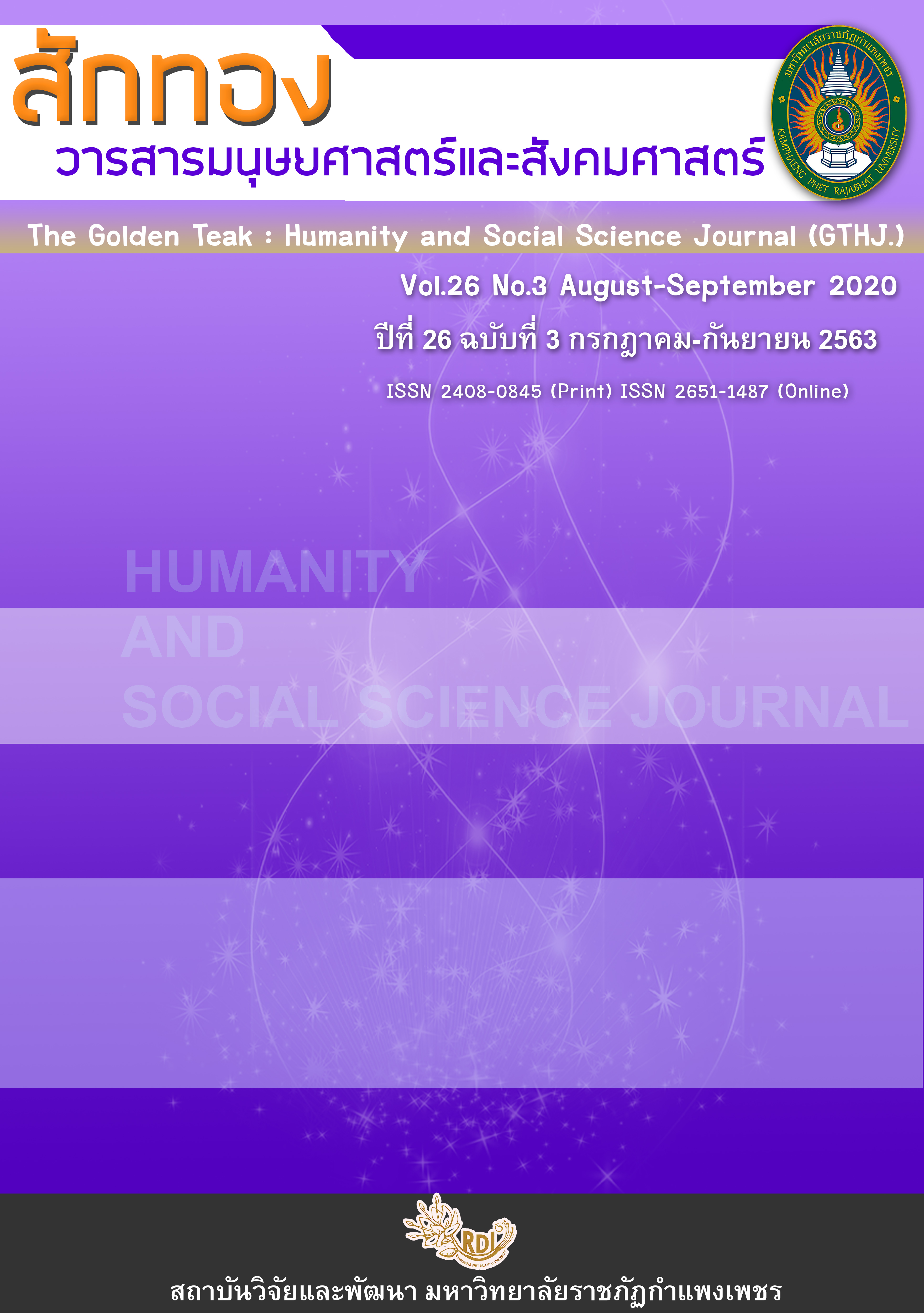Project-Based Learning with Social Media to promote Information and Technology Skills of learner in the 21st century
Main Article Content
Abstract
Project-Based Learning with Social Media to promote Information and Technology Skills of learner in the 21st century. A model of learning the technology and social media to use. In the Project-based Instruction. This is the approach that is suitable for the teaching of all levels. As to how the skills both 3 aspects, life skills and work skills, and innovation, skills and information media. Each technology has enabled the students to the skills of effective elements to include the results, record, report writing Presentation, reporting and reflection effects. In this article the author has synthetic steps in Project-based Instruction in 6 steps such as 1) prepare 2) to determine the topic/Feasibility study 3) planning/write outline 4) practice project 5) presentation 6) Evaluate and, including social media for Project-Based Learning such as 1) Facebook 2) LinkedIn 3) twitter 4) YouTube 5) WordPress and 6) slide share. The project-based learning integrated with social media to promote information and technology skills to students in learning 21st century .The student can study interest, aptitude can research, knowledge of what their interest and can find the answer. To act as a process. The application of social media as a tool to help enhance the learning efficiency and make students that. On the skills of information technology, increase. And make teaching and learning is more efficient.
Article Details

This work is licensed under a Creative Commons Attribution-NonCommercial-NoDerivatives 4.0 International License.
บทความที่ได้รับการตีพิมพ์เป็นลิขสิทธิ์ของวารสาร สักทอง : วารสารมนุษยศาสตร์และสังคมศาสตร์ สถาบันวิจัยและพัฒนา มหาวิทยาลับราชภัฏกำแพงเพชร
ข้อคิดเห็นใดๆ ที่ปรากฎในวารสารเป็นวรรณกรรมของผู้เขียนโดยเฉพาะ ซึ่งมหาวิทยาลัยราชภัฏกำแพงเพชรและบรรณาธิการไม่จำเป็นต้องเห็นด้วย
References
Barell, J. (2010). Problem-based learning : The foundation of 21st century skills. [Online]. Available : http:// www.morecuriousminds.com/docs/21stCSummary2.pdf
[2019, January 11].
Bellanca & R. Brant. (Eds.). 21st century skills : Rethinking how students learn. Bloomington. IN : Solution Tree Press.
Bender, W.N. (2012). Project-Based Learning : Differentiating Instruction for the 21st Century. California : CORWIN A SAGE Company.
Bunyasiri, P. (2010). Strategies Learning Management by the Project Education. Bangkok : Institute of academic development.
Cole, J.E. & Wasburn-Moses, L.H. (2010). Going beyond “the math wars.” A special educator’s guide to understanding and assisting with inquiry based teaching in
mathematics. Teaching Exceptional Children, 42(4), 14-21.
Dechacub, P., Yindeesuk, P. & Meesri, R. (2010). Teaching ideas with the project : teaching integrated. Bangkok : Chulalongkorn University.
Fried-Booth, D. (2002). Project work. New York : Oxford University Press.
Holloman, C. (2013). The social media MBA. West Sussex. England : John Wiley & Son.
Kanda Runnapongsa Saikeaw. (2010). Social Media. [online]. Available : http://www.slideshare.net/krunapon/socialmedia-5661152 [2019, January 5].
Katz, L.G. & Chard, S.C. (1994). Engaging Children's minds : The Project. Approach. New Jersey : Ablex Publishing. Kemmis, Stephen and Robin Mc Taggart.
Khammanee, T. (2008). The instructional model of wide variety of choice. Bangkok : Chulalongkorn University.
_______. (2005). Instructional psychology. Bangkok : The Master group manage.
Khuana, K. & Khuana, T. (2018). The Instruction Focuses on Research : Instructional Paradigm in the 21st Century. The Golden Teak : Humanity and Social Science Journal (GTHJ.), 24(1), 2
Markham, T. (March 7, 2011). Strategies for Embedding Project-Based Learning into STEM Education. [Online]. Available : http://www.edutopia.org [2019, January 11].
Moursund, D. (2009). Project-Based Learning : Using Information Technology. New Delhi : Vinod Vasishtha for Viva Books Private limited.
Muccasamun, W. (2011). Teaching project. Bangkok : Chulalongkorn University.
Noinakorn, S., et al. (2019). Promoting Creative problem solving by Project-based learning integred with facebook. Journal of education Naresuan university, 21(3), 213-215.
Office of the Education Council. (2007). Project-based learning. bangkok : The promotional group. Innovations in learning, tutors and educational personnel.
Panich, V. (2012). Way of learning for students in the 21st century. Bangkok : Taphata publishtion.
_______. (2013). Creating learning to Century 21. Bangkok : Siam Commercial Foundation.
Phongein, W., et al. (2013). The teaching is project-based. Bangkok : Faculty of Technical Education King Mongkut's University of Technology North Bangkok.
Phukeart, L. (2009). Project-based learning: principles and guidance activities. Bangkok : Faculty of Education Chulalongkorn University.
Ribé, R. & Vidal, N. (1993). Project Work : Step by Stepp. Oxford, Heinemann.
Rueangrong, B. (2014). Teaching children about technology and communication. Faculty of Education. Nakhon Si Thammarat Rajabhat University.
Rueangrit, N. (2010). The development of an collaboration project-based learning model focusing on APEC education exchange program to enhance communicative and
collaborative skills of thai and south Korean student. Faculty of Graduate School, Silpakorn university.
Taylor, L.M. & Fratto, J.M. (2012). Transforing Learning through 21st Century Skill. New Jersey : Prentice Hall.
Trakulsarit, W. (2008). Approaches to learning project. Bangkok : M I T Printing.
White, C.M. (2012). Social media, Crisis communication, and emergency management : Leveraging web 2.0 technologies. Boca Raton : CRC.
Wongsuwan, S. (1999). Learning for the 21st Century learning, students create a self-knowledge "project". Bangkok : Office of the Basic Education Commission.


